Monday: Media Representation and Sexual Violence
7000 in Solidarity’s Consent Week began on campus yesterday in Bruin Plaza with an event addressing sexual violence, followed by an evening discussion of gender representation, intersectionality, and the media in Young Hall. 7000 in Solidarity is a multifaceted campus-wide campaign against sexual assault that works to raise awareness and foster a safe environment for survivors and all students.
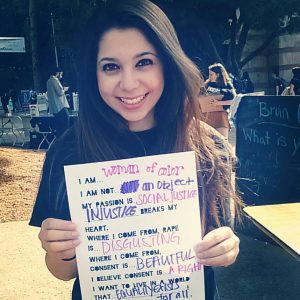
Savannah Badalich, 7000 in Solidarity organizer, started off the discussion “Media Representation and Sexual Violence” by speaking about the silencing of women on Internet forums like Reddit.
In her six years as a Reddit “lurker” (a member who rarely posts or comments on posts), Badalich observed numerous disturbing cases of harassment, usually directed at women. Though the number of men and women who use the Internet are roughly equal, Badalich noted that it doesn’t mean “we’re treated equally on the Internet as women.”
Reddit has a predominately young, male userbase. Badalich explained that if you identify yourself as a woman on Reddit, you often receive negative feedback on your posts merely due to your gender. She has seen Redditors dismiss women by demanding “TITS or GTFO.” In extreme cases, if women did not comply, their private information would be stolen and posted on a public forum. Badalich said,
“It’s as if we’re only needed as a sexual object.”
In addition, problematic subreddits have become infamous like r/beatingwomen, r/jailbait, and r/candidfashionpolice.
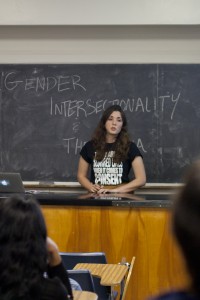
Badalich observed a thread in which a woman posted on the Ask Reddit subforum outlining the details of her sexual assault and asking for advice on how to proceed with possibly pressing charges and moving on. The woman was attacked for being a “slut,” for “asking for it,” and had one commenter go so far as to dismiss the entire story as, “a wonderful tale of not rape.”
While this traumatic virtual slut-shaming is far too common, an edit on the original post revealed that through the barrage of negative messages, someone had private messaged the woman and helped her learn how to press charges.
Badalich noted that it is often hard to do positive activist work without getting flack on a site like Reddit. After posting to the UCLA subreddit about a 7000 in Solidarity event, Badalich received a harassing message telling her to “close your legs and get over yourself.”
Badalich disagreed with this method of discourse, saying “Silencing is not a form of criticism. It actually impedes on my own free speech.” She said she only feels comfortable posting on some smaller, safer threads. Challenging the trend of abusive isolation and alienation, Badalich addressed the issue of women feeling like “we need our own sections of the internet.”
In order to illustrate the extent that internet harassment can affect women, Badalich used the story of Anita Sarkeesion, the activist behind the Youtube channel Feminist Frequency and the video series “Tropes vs Women.” Badalich explained that when Saekeesion made a kickstarter to fund a project to talk about women in video games, she faced harassment that escalated very quickly. Hackers attacked Saekeesion’s website, made unflattering memes mocking her activism, and most startlingly, made a flash game called “Beat the Bitch Up” in which players would click an image of Saekeesion’s face to injure her.
“This is the kind of sexual violence and gender-based violence women face,” Badalich said. “They use these threats to silence us. It’s tragic.” Badalich also pointed out that this climate perpetuates victim-blaming and normalizes violence against women as well as dissuades women form speaking on the Internet. Badalich concluded,
“It probably will not stop anytime soon unless we feel safe enough to speak against it.”
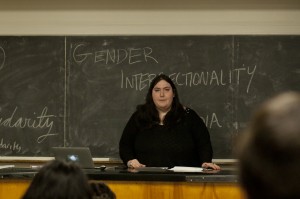
“Raise your hand if you don’t like your thighs,” Alexandra Tashman said from the front of the room. Almost everyone raised his or her hand, men and women alike.
Tashman, a third-year geography and political science student, spoke about fat-shaming and eating disorders as media approved violence.
She explained that we must be skeptical of the media because companies profit from our insecurities by selling us products to “fix” ourselves. “It’s normal, we feel, to hate parts of ourselves,” Tashman said. She discussed her struggles with multiple eating disorders since the age of 7 and spoke about coming to accept ourselves as we are. Tashman pointed out,
“Nobody looks like Kate Moss-not even Kate Moss…We have to try not to obsess about these impossible, Eurocentric, made-up, ridiculous ideals because we will never achieve them…Eating disorders are a socially accepted method of self-harm sold to us inside every magazine.”
Because of this, we are all victims of the body shame created by our culture. An exclamation of surprise could be heard from the crowd when Tashman revealed that “eating disorders have the highest mortality rate of any mental illness.” In order to eliminate shaming, Tashman said we need to recognize why the media functions the way it does, and accept ourselves to combat this issue as a whole.
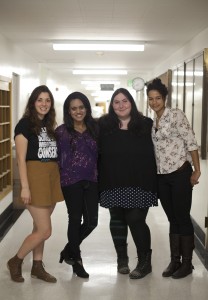
Next, Arami Walker performed her spoken word piece, “Womanifesto.” In it she explored the disempowering nature of hip hop with lyrics like “bitches ain’t shit but hoes and tricks.” Walker posed the question, “Am I supposed to hang my dignity by my bikini strings?” Later in the poem, Walker talked about the consequences of these champagne-soaked over-sexualized escapades, arguing “they will never fucking tell you what their actions will bring.” Walker visualized these consequences with a metaphor about pregnancy scares and STD tests, and concluded with a message of empowerment as she said,“I am worth more than my hips, ass, and thighs… I will no longer let a man dictate what it means to be a woman. I am worth more, you are worth more, we are all worth more.”
Last, Ayesha Khan presented her piece, “50 Shades of Exoticism,” a discussion about the term “exotic” in relation to women and how it is used to disempower and promote mistreatment of women.
She traced the origin of the word back to colonial times, where colonizers used it to characterize people because it meant “very different, strange, or unusual.” When Khan googled the terms “exotic” and “women of color,” the search yielded mostly porn and mail-order bride sites. Why is this a reality? Khan answered that “colonialism and imperialism implies ownership. Women of color were viewed as racially subordinate objects, therefore there is racialized sexism.” Correspondingly, radicalized sexism promotes a view of women of color as people who like to be dominated, submissive, and domesticated. The degree to which women of color are objectified and subordinated, especially in porn, promotes the normalization of extreme sexual behavior and sexual violence.
“We are more than our vaginas, I promise,” Khan said.
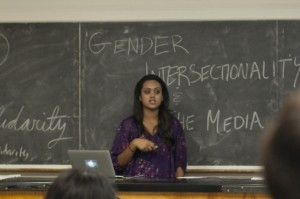
Khan challenged everyone to realize that the “exotic” women “you see online, on TV, or on porn is not me.” By illustrating how media impacts everything we do, Khan showed how the stereotyped depiction of different ethnicities leads viewers to believe the problematic representation rather than the reality. She also asked the audience to recognize that “exotic” is not a compliment and to remember to treat every person as the human being they are.
Khan ended her speech by reading Suheir Hammad’s spoken word poem, “Not Your Erotic, Not Your Exotic.”
Third-year political science major Negeen Sadeghi came out to the panel event because she is interested in these types of issues. Sadeghi said, “It’s really important to have a conversation about the misrepresentation of women in our society. It’s a good dialogue to have.”
We need to continue this dialogue by consciously challenging gender representation in the media and addressing the consequential normalization of harassment, abuse, and sexual violence.




